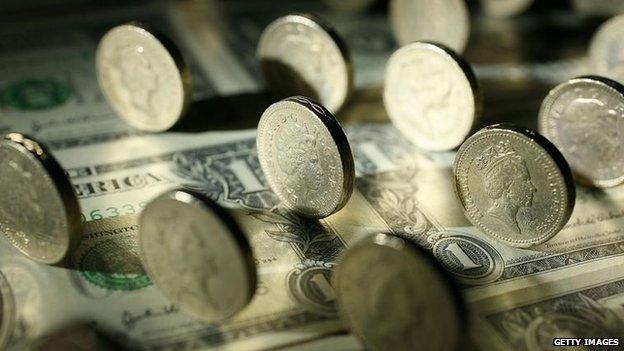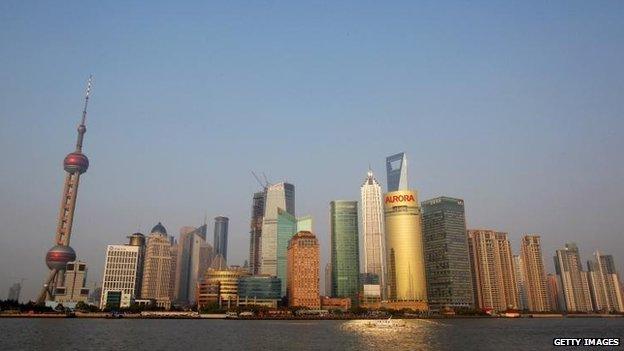The next financial crisis?
- Published
- comments

How worried should we be by the massive financial power of huge managers of assets such as BlackRock and Pimco - with their trillions of dollars of our money under their management?
The central bankers' central bank, the Bank of International Settlements, resonantly describes them in its latest annual report as "like an elephant in a paddling pool" - in the sense that they are enormous compared with many of the economies in which they put their (our) cash, such that when they decide to invest or disinvest, they "can amplify dislocations".
Or to put it in plainer English, the decisions of just a few of them can cause boom or bust for entire economies.
The BIS points out that just a 5% reallocation of the $70 trillion dollars in assets under the sway of the larger asset management businesses from rich advanced economies to emerging markets would result in a flow of $3.5 trillion - which is equivalent to 13% of the value of all emerging market shares and bonds.
So just imagine what that would do to bond and share prices of a smaller economy, if the asset managers decided to pile in or stampede out in a herd - which, errr, you may know is how they typically tend to behave.
In those smaller economies, as and when the asset managers charge for the exit, businesses and governments can find themselves starved of vital funds.
And since the domestic currencies of these relevant economies would tend to collapse in those circumstances, the corporate borrowers would struggle to repay and refinance bond debts as they fell due.
We would be in the territory of serious financial and economic crisis.
Changing role
How big a risk is there of such a crisis right now?
Well since the beginning of 2008, residents in emerging markets have borrowed over $2 trillion abroad - and the amount borrowed would be more than a third higher when the debt issued by offshore vehicles of these residents is included (a Korean business might borrow through an overseas affiliate, for example, and be liable for its debts).
Now far and away the lion's share of this debt has been provided by fund managers and investors, who have bought bonds, rather than by banks lending directly.
The point is that as banks have become less willing and able to lend - both domestically in the West and everywhere across borders - asset managers have to an extent taken up the slack.
Here is the thing. There is still a colossal mind-blowing amount of cash or liquidity in the world.
In fact this cash has been amplified by all that market-distorting, money creation by central banks such as the Bank of England and the Federal Reserve (you remember Mr Quantitative-Easing and his marginally less profligate cousin Mr Credit-Easing).
But the big holders of all this cash typically lost confidence in banks, during the financial crisis of 2007-08.
So (as UK small businesses and households know only too well) the role of banks in credit creation has been reduced over the past few years - partly because they have become more cautious and partly because they have struggled to take in funds.
Instead giant fund managers have steadily become more important channels for financing businesses and entire economies - particularly in the developing world.

China is one of the places identified by the BIS as being most vulnerable to a banking crisis
When interest rates collapsed in most of the low-growth rich West, asset managers looked for better opportunities to earn returns in - for example - the higher-yielding debts of emerging markets.
One consequence is that the average nominal long-term bond yield for emerging markets - the interest rate on this debt - has fallen from 8% in 2005 to around 5%. And adjusting for inflation, this gives a real interest rate of just 1%.
That interest rate looks low, probably too low, in view of the underlying risks of investing in these economies.
Squeezing a blancmange
What gives further pause for thought is that the BIS identifies Brazil, China and Asia in general as among the places most vulnerable to a banking crisis, based on three indicators: the rate at which credit is being created at the moment compared to historical norms, property price trends, and the ratio of debt service payments to income.
In a way, this is another version of the story I have been sharing with you for almost a year, which is the vulnerability of the world's second biggest economy, China, to a financial shock.
And the other bigger point is this one.
It is all very well for governments and regulators to have concentrated their efforts on sanitising and strengthening the banking system since the great debacle of six years ago.
But global financial integration means that attempts to rein in one part of the credit-creation industry is like squeezing an enormous blancmange - it causes a great bulge elsewhere, in this case in asset management (and what is often described as shadow banking).
Banks do not have the unique privilege and power to foment devastating cycles of boom and bust in markets and economies.
The next crisis, which may be nearer than we think, may well be triggered by over-mighty asset managers.